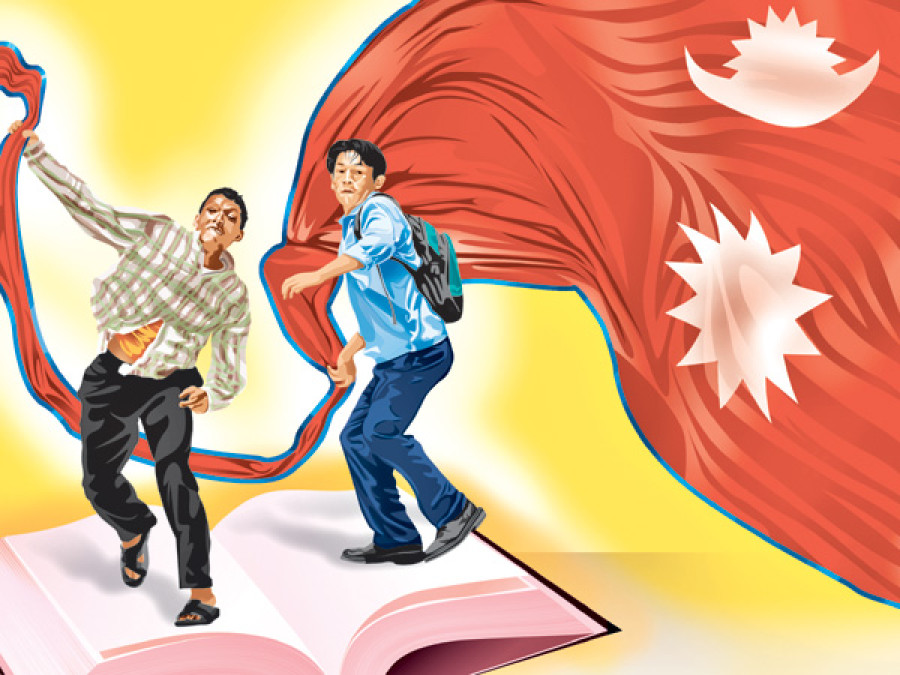Opinion
Southern unrest
If peaceful movements are not managed well, frustration will give rise to violence
Krishna Kumar Sah
Social movements are necessarily anti-systemic actors. Socially shared activities and beliefs directed towards a demand for change in the existing system or order are social movements. Efforts to bring change may be pervasive and encompass many aspects of society, as did the revolutions of France in 1789, Russia in 1917 and China in 1949. American sociologist Charles Tilly has said that social movements change over time, in aspects as different as the number and quality of the actors involved in protest events, cultural interpretations of the conflict, issues at stake, repertoires of action and degree of radicalisation.
Madhesis have been protesting against the new Constitution that was promulgated through a fast-tracked finalisation of a long writing process which gained speed after the earthquake. The movement has extensive participation and is entrenched in broad popular support among all Madhesis for the Madhes agenda. It has so far cost the lives of more than 50 protesters and bystanders besides around 10 police officers. The obstruction by the protestors at the border crossings and transport arteries has resulted in a sharp drop in imports and consequent shortages of gasoline and other basic supplies across the country. The protesters want amendments to be made to the Constitution and, in particular, changes in the boundaries of the proposed new federal provinces.
Academic exercise
The Madhes movement is the central topic of discussion at teashops, bars, bistros, schools and universities. Almost all the classes of each paper hold discussions about the Madhes movement in the MPhil programme in sociology. Tribhuvan University offers a course titled Social Movements: Studies on Collective Actions for Change in the first semester. The course is especially designed to provide an understanding of different social movements at home and abroad academically. However, even other classes do not miss discussing this hot issue. One day, a prominent teacher who does not teach the course was asked, “Is the Madhes movement a social movement?” One of our friends replied in the affirmative with supporting arguments from theories and examples in the course, and clearly identified the Madhes movement as a social movement. “Then we have to revisit and revise the course,” the teacher replied instantly without any further explanation or arguments. The intensity of the discussion was almost clear, and I tried to analyse the movement based on American sociologist Theda Skocpol’s structure; but I have not yet been able to get a concrete answer whether the Madhes movement is a social movement or not.
Change and conflict are basic facts of human society. Society is always in motion and rejects the existing power, domination, action and system. It acts to bring change against the resistance of institutional rules, fixed beliefs or control. Madhesis residing along Nepal’s southern border have obtained key positions in the successive waves of political protests that marked the country’s shift to full parliamentary democracy in 1990. Since last July, the southern plains have again become a scene of unrest as activists from the Madhesi communities launched a protest against the fast-track constitution-writing process which they claim threatens to eliminate earlier reforms intended to address deep-rooted discrimination against them.
Madhesi activists and parties, who are not part of the alliance, rejected the drafts that emerged. They say they renege on earlier agreements on provincial boundaries, water down provisions for affirmative action, fail to guarantee an equal weighting of votes, and impose restrictions on citizenship that specifically target Madhesis. Despite the fact that Madhesi leaders in the major parties echoed these criticisms, government leaders doubted there was popular support for the protesters’ demands, and dismissed the need to address them.
Mutual suspicion
Madhesis claim that the Interim Constitution was more progressive because these reforms had been incorporated in it after a previous protracted mass movement in 2007-08. They include an autonomous federal province in Madhes/Tarai as well as measures on affirmative action. Support for the protests has both breadth and depth among ordinary Madhesis. Political mobilisation is strongest in the eight districts that are currently already part of the Madhes province envisaged under the new Constitution. Almost half of Nepal’s population lives in Madhes/Tarai. Madhesis can also be found in neighbouring Indian states and have extensive cross-border cultural and family ties. Because of these connections, the hill-centric Nepali state has long suspected these groups of harbouring divided loyalties, and tried to contain their political influence.
It is true that six months of unrest has taken a toll on livelihoods not only in the hills, but also in the Tarai. However, the nature of the protest and the level of participation mean that quick fixes will not deliver a lasting political settlement. A superficial compromise and general exhaustion may bring a temporary pause to the protests. But avoiding constant instability will require a new, overarching political settlement which is widely seen as legitimate. History teaches that movements take a number of forms and integrate differently within domestic societies. So the country and its development will continue to suffer due to protests, strikes, movements and short-term deals. The movement involves beliefs, perceptions or understanding about what is wrong and how the wrongs should be rectified. If peaceful movements are not managed well, there is a danger that people’s frustration will give rise to armed violence and problems of secession.
Sah is doing an MPhil in sociology at Tribhuvan University and is a researcher at the Nepal Madhesh Foundation




 23.51°C Kathmandu
23.51°C Kathmandu










